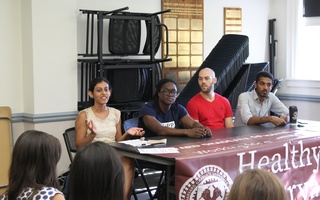Graduate student union effort spokesperson Jack M. Nicoludis raised concerns about an administrator's email that said Harvard would release information on students eligible to vote in the upcoming union election to the National Labor Relations Board and Harvard Graduate Students-United Auto Workers.
That email, sent by Office of Labor and Employee Relations Director Paul R. Curran to all eligible students, detailed the NLRB’s subpoena of student information in compliance with the Family Educational Rights and Privacy Act.
University spokesperson Anna Cowenhoven wrote in an email that Harvard was “legally required to notify students that their information would be shared,” because some of the information requested is protected by FERPA.
According to FERPA rules, universities do not need to individually notify students about the release of directory information, which includes names, date of birth, phone number, address, email, and department of study.{shortcode-35e5ab99124e6cc287076769e361c37c6cdc34c9}
However, some of the information required by the subpoena goes “beyond what is publicly available through the University directory,” Cowenhoven wrote, namely the request for student employment positions such as teaching fellows and course or research assistants as well as the school or department in which they work.
Nicoludis said the “unnecessary legal jargon” in Curran’s email served only to complicate a regular part of union elections.
“By citing unfamiliar statutes in detail and then writing that you ‘have the right to object to the subpoena and release of your personal information’ makes a normal and essential step in all union certification elections appear oppositional and invasive,” Nicoludis wrote in an email.
Cowenhoven wrote, “We are working to communicate clearly on these important issues so that students, who are eligible to vote and would be impacted by unionization, know their information will be shared and how they may object, should they choose to do so.”
In the pre-election agreement signed by Curran and graduate student union organizers, both parties agreed that Harvard “is required by [FERPA] to give notice that non-directory information about them will be provided to third parties, pursuant to a lawfully-issued subpoena.”
When a union election is held at a university, it is normal for a subpoena to be issued requesting student information. Providing lists of eligible voters is “necessary to a fair and free election,” Nicoludis wrote.
“Unfortunately, the university uses this language to make it seem like the union is gaining access to personal information, where in reality this is a very normal process that happens in all unionization efforts and is required by the NLRB,” Nicoludis wrote.
Universities do not have to notify students individually if and when they release personally identifiable information to a third party, but they do need to notify students that a subpoena was issued for the information—barring one issued by law enforcement—like the one issued from the NLRB.
According to a Department of Education spokesperson, there is some leeway on notification method depending on how many students have to be reached.
“If the number of students about which the university received a subpoena for their records is very large, say in the hundreds or thousands, the Department has advised that notification could be made in a more general way that would reasonably reach the student (email, newspaper, website, or combination of methods),” the spokesperson wrote in an email.
Cowenhoven wrote that Harvard was "aware of other opportunities to notify students but felt that email was the best and most direct channel through which we could be reasonably assured that students would be informed."
Like Harvard, Cornell University also individually notified its students that it was required under court order to provide their information when its graduate students moved forward with their own unionization process. In its pre-election agreement signed in May, Cornell and its graduate student union effort agreed that “notice, which has been vetted and approved by the Union” must be “given to all affected students whose information will be released.”
Cornell’s Senior Vice Provost and Dean of the Graduate School Barbara A. Knuth, who signed the letter to students, wrote in an email to The Crimson that the wording of the agreement was carefully crafted.
“Based on the consultation of Cornell’s legal counsel (who is expert in FERPA) and the Union’s legal counsel, the Agreement wording was developed and agreed to by both parties, to address the Union’s request for information including directory and non-directory information,” Knuth wrote.
“We believe that every student who would be voting in the union representation election (and who would be in the collective bargaining unit should an election result in favor of union representation) should be fully-informed regarding issues associated with union representation,” she added.
—Staff writer Leah S. Yared can be reached at leah.yared@thecrimson.com. Follow her on Twitter @Leah_Yared.
Read more in University News
Management Company Reportedly Described as ‘Lazy,’ ‘Stupid’ by Employees in 2015 ReviewRecommended Articles
-
 Despite Student Concerns, College Says BSC Move Will Not Affect Privacy
Despite Student Concerns, College Says BSC Move Will Not Affect Privacy -
GSAS Council Creates New PositionThe Graduate Student Council voted to modify the council’s constitution to create a new at-large representative position for the School of Engineering and Applied Sciences in its first meeting of the year on Wednesday.
-
Harvard, Graduate Student Union Representatives Meet Officially Following NLRB RulingUniversity labor representatives and graduate student union organizers did not create a formal neutral agreement during their first official meeting on Sept. 9, according to union spokesperson and Ph.D. student Jack M. Nicoludis.
-
 Grad Student Union Effort Will Not Seek ‘One-Size-Fits-All’ Approach
Grad Student Union Effort Will Not Seek ‘One-Size-Fits-All’ Approach -
 University to Give Thousands of Students’ Information to Labor Board
University to Give Thousands of Students’ Information to Labor Board













